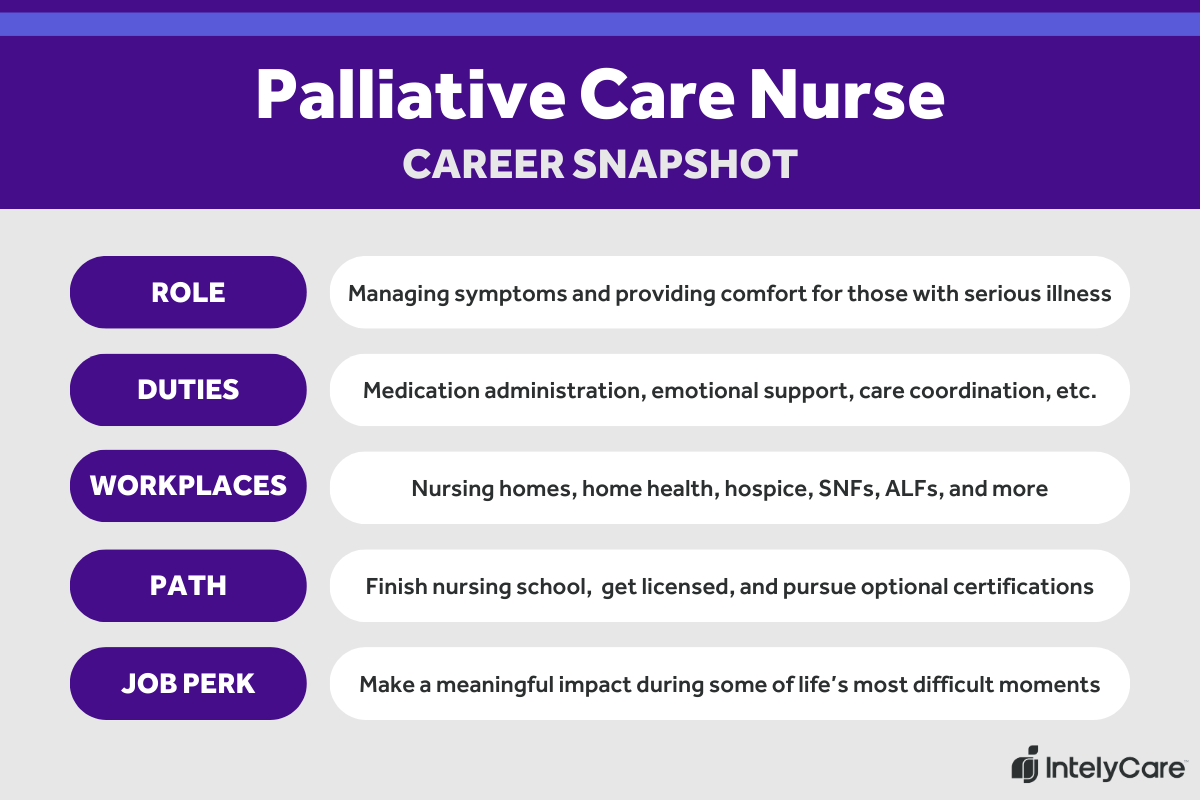Is Being a Palliative Care Nurse Right for You?

A palliative care nurse is a healthcare professional who cares for patients with serious illnesses, focusing on providing comfort and managing symptoms. They’re the ones who bring warmth and solace to bedside care. It’s not just a job; it’s also a chance to make a real difference in people’s lives when they need it most. If you have a heart that beats for others, this profession might be a great fit for you.
Here’s your go-to guide for everything you need to know about the palliative care nursing role. We’ll walk you through education, responsibilities, salaries, potential workplaces, and more.

What Is a Palliative Care Nurse?
Palliative care nursing is dedicated to providing care to patients with serious, complex, or terminal illnesses, focusing on improving quality of life. Palliative care can go hand in hand with medical interventions. In contrast to hospice, where care focuses on comfort only, palliative care provides relief from suffering while patients may still receive medical treatment for their condition.
Unlike many other nursing professions that primarily focus on treating diseases, palliative care focuses on providing comfort, alleviating pain, and addressing emotional and spiritual needs.
Patients in palliative care usually have illnesses that seriously affect their lives. Some examples include:
- Advanced cancer
- End-stage heart failure
- Neurological disorders, such as amyotrophic lateral sclerosis (ALS) or multiple sclerosis (MS)
- End-stage respiratory disease, such as chronic obstructive pulmonary disease (COPD) or pulmonary fibrosis
- End-stage renal disease
- Alzheimer’s disease and other dementias
What Does a Palliative Care Nurse Do?
In addition to performing standard nursing tasks like head-to-toe assessments, palliative care nurse roles and responsibilities include:
- Administering medications and treatments to manage symptoms such as nausea, shortness of breath, and fatigue to improve a patient’s quality of life.
- Providing emotional support and counseling to patients and their families.
- Offering spiritual support and guidance, respecting patients’ beliefs and preferences, and facilitating connections with religious or spiritual resources if desired.
- Coordinating care with other healthcare professionals and community resources.
- Advocating for patients’ rights to make end-of-life decisions, including preferences for life-sustaining treatments, resuscitation, and hospice care.
Hospice vs. Palliative Care Nursing: What’s the Difference?
Hospice care is a form of palliative care provided to patients who have a prognosis of six months or fewer to live, focusing on end-of-life comfort and support. Palliative care, on the other hand, is provided to individuals with serious illnesses at any stage of their illness, even for those who’re still seeking treatments for a cure.
Where Do Palliative Care Nurses Work?
These nurses can work in a range of healthcare settings. Here’s a look at some of the common places where these compassionate professionals can be found:
- Assisted living facilities
- Hospitals
- Hospices
- Neurology clinics
- Nursing homes
- Home healthcare agencies
- Concierge assignments
- Palliative care clinics
- Cancer centers
- Long-term care facilities
- Community health organizations
- Veterans’ hospitals
- Rehabilitation centers
How Much Does a Palliative Care Nurse Make?
The typical palliative care nurse salary in the U.S. is $125,410 per year, ranging between $116,434 and $136,337. Your salary can vary based on several factors, including your years of experience, the type of facility you work in, your certifications, and geographical location.
Open to relocation? Consider submitting your nursing resume to one of these top-paying states:
To see what you might earn in your location, look at some of the latest hospice nurse jobs, which can often overlap with palliative care jobs.
The Pros and Cons of Palliative Care Nursing
Being a palliative care professional comes with its own set of unique challenges and rewards. Here are some pros and cons associated with this profession.
Pros of palliative care nursing:
- Meaningful impact: You’ll be able to make a real difference in people’s lives during some of their toughest moments.
- Diverse work settings: You’ll have an opportunity to work in various settings, from hospitals to homes, which can offer uniquely rewarding experiences.
- Personal growth: You’ll continually learn and grow, both personally and professionally, as you navigate the complexities of end-of-life care.
- Spiritual fulfillment: You’ll have the opportunity to integrate spiritual and stress-relieving practices like deep breathing, meditation, and mindfulness into patient care, providing a holistic approach to comfort and support.
Cons of palliative care nursing:
- Emotional toll: You’ll need to prioritize self-care, since dealing with end-of-life situations can be emotionally taxing and may lead to burnout.
- Difficult conversations: You’ll often need to have tough conversations about prognosis and end-of-life decisions with patients and families.
- Ethical dilemmas: You’ll face complex ethical and medical decisions, which can be tricky to navigate.
- Challenging cases: You’ll encounter some challenging cases, involving advanced medical conditions with severe symptoms that are difficult to manage effectively.
How to Become a Palliative Care Nurse
Working in this field involves specific steps, including meeting educational requirements and gaining relevant experience. Here’s a general guide on how to step into this profession:
1. Pursue Education and Licensure
First, become a registered nurse (RN). Start by earning a nursing degree from an accredited program. Then, pass the National Council Licensure Examination (NCLEX-RN) to get your RN license.
2. Gain Clinical Experience
Acquire hands-on experience in a clinical setting. Working in acute care, a progressive unit, or an ICU environment can be particularly valuable to develop the skills necessary for working in this field.
3. Pursue Palliative Care Nurse Certification (Optional)
If you want to boost your credibility, you can choose to pursue specialty-specific certification. The Hospice and Palliative Credentialing Center (HPCC) offers several certifications, including:
- Certified Hospice and Palliative Nurse (CHPN)
- Advanced Certified Hospice and Palliative Nurse (ACHPN)
- Certified Hospice and Palliative Pediatric Nurse (CHPPN)
- Certified Hospice and Palliative Licensed Nurse (CHPLN)
4. Pursue Advanced Education (Optional)
Have high ambitions? Go the extra mile with advanced education, like a master’s of science in nursing (MSN) or a doctor of nursing practice (DNP) degree. These could help you become a palliative care nurse practitioner. Although this step isn’t required to enter this field, it can help take your career to new heights.
Frequently Asked Questions About Palliative Care Nursing
Do only terminally ill patients receive palliative care?
No, some patients may receive palliative care along with treatment aiming to cure their illness. In this case, palliative care relieves their suffering during the treatment process.
What resources and support are available for nurses working in this field?
Nurses in palliative care have access to various resources and support systems to improve their practice and handle the challenges they face in their work. Some of these include:
- Continuing education resources
- Helpful books and journals
- Nursing conferences
- Palliative care organizations
- Peer support networks
- Professional associations
- Support groups
What is the job outlook for nurses working in palliative care settings?
The overall job outlook for registered nurses, which includes those in palliative care, is projected to grow by 6% in the next decade, which is faster than the average for all occupations.
How do nurses address cultural and spiritual diversity in patient care?
Nursing and palliative care professionals may collaborate with shamans, spiritual counselors, priests, death doulas, and naturopathic doctors to build a caring environment that respects patients’ beliefs. Understanding diverse cultural, religious, and spiritual beliefs is key to providing culturally congruent care.
Ready to Become a Palliative Care Nurse?
Ready to join this meaningful specialty? IntelyCare is your matchmaker for the most fitting nursing opportunities. The job you’re seeking is also seeking you. Discover your job match today.
